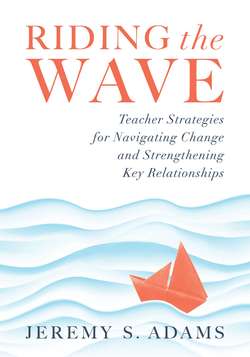Читать книгу Riding the Wave - Jeremy S. Adams - Страница 11
На сайте Литреса книга снята с продажи.
Adapting to the Changes
ОглавлениеA fellow history teacher in the district where I teach, who also happens to be my older and wiser brother, Howard, said something that I connected with as I was writing this book:
The problem with the constancy of change for us teachers is that after a while it eventually just becomes noise. This is daunting on a million different levels. But the worst part is teachers who can’t cut through the noise never flourish. They just get by. (H. Adams, personal communication, December 2018)
Teachers at all grade levels, no matter where they find themselves in their careers, must be able to confront the constancy of change in education so that they do more than merely “get by.” And my goal with this book is to assist them in doing so. I want to empower teachers to flourish. I want to impassion them to excel. The best teachers possess dexterous skills—some pedagogical and professional, some personal and intellectual—that allow them to successfully manage those changes that define the teaching profession. Thus, this book aims to help teachers adapt to the never-ending process of reform and change so that teaching remains both vital and meaningful to them.
As any veteran teacher can attest, there comes a moment in every teacher’s life when the newest wave of reform no longer appears as an opportunity to ride higher and cultivate fresh skill sets. Instead, new waves become menacing in their constancy, forces of nature that must be endured if one is to continue the odyssey of classroom instruction. From this perspective, it should surprise no one that anxiety and apprehension are fixtures in the lives of teachers.
This book offers a sensible approach to change that is both sympathetic to the various difficult situations teachers often find themselves in and positive in the belief that teachers can find, or recover, the deeper meaning of everyday classroom instruction. Hence the title—finding this deeper meaning hinges upon teachers riding each wave of reform, recognizing it as one they can deftly navigate, not one that will surely overcome them. As David B. Cohen (2017), author of Capturing the Spark: Inspired Teaching, Thriving Schools (Cohen, 2016), has argued, “The question is whether or not educators can make choices or select strategies that seize the exciting potential of change without feeling so overwhelmed that we want to leave the field” (p. 34).
